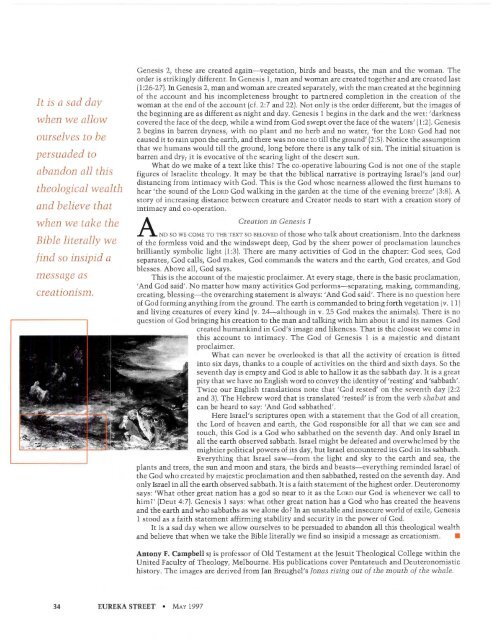n - Eureka Street
n - Eureka Street
n - Eureka Street
You also want an ePaper? Increase the reach of your titles
YUMPU automatically turns print PDFs into web optimized ePapers that Google loves.
It is a sad daywhen we allowourselves to bepersuaded toabandon all thistheological wealthand believe thatwhen we take theBible literally wefind so insipid amessage ascreationism.Genesis 2, these are created again-vegetation, birds and beasts, the man and the woman. Theorder is strikingly different. In Genesis 1, man and woman are created together and are created last( 1 :26-27). In Genesis 2, man and woman are created separately, with the man created at the beginningof the account and his incompleteness brought to partnered completion in the creation of thewoman at the end of the account (cf. 2:7 and 22). Not only is the order different, but the images ofthe beginning are as different as night and day. Genesis 1 begins in the dark and the wet: 'darknesscovered the face of the deep, while a wind from God swept over the face of the waters' ( 1 :2). Genesis2 begins in barren dryness, with no plant and no herb and no water, 'for the LoRD God had notcaused it to rain upon the earth, and there was no one to till the ground' (2:5). Notice the assumptionthat we humans would till the ground, long before there is any talk of sin. The initial situation isbarren and dry; it is evocative of the searing light of the desert sun.What do we make of a text like this? The co-operative labouring God is not one of the staplefigures of Israelite theology. It may be that the biblical narrative is portraying Israel's (and our)distancing from intimacy with God. This is the God whose nearness allowed the first humans tohear 'the sound of the LORD God walking in the garden at the time of the evening breeze' (3:8). Astory of increasing distance between creature and Creator needs to start with a creation story ofintimacy and co-operation.ACreation in Genesis 1ND so WE COME TO THE TEXT so BELOVED of those who talk about creationism. Into the darknessof the formless void and the windswept deep, God by the sheer power of proclamation launchesbrilliantly symbolic light (1:3). There are many activities of God in the chapter: God sees, Godseparates, God calls, God makes, God commands the waters and the earth, God creates, and Godblesses. Above all, God says.This is the account of the majestic proclaimer. At every stage, there is the basic proclamation,'And God said'. No matter how many activities God performs-separating, making, commanding,creating, blessing- the overarching statement is always: 'And God said'. There is no question hereof God forming anything from the ground. The earth is commanded to bring forth vegetation (v. 11)and living creatures of every kind (v. 24- although in v. 25 God makes the animals). There is noquestion of God bringing his creation to the man and talking with him about it and its names. Godcreated humankind in God's image and likeness. That is the closest we com e inthis account to intimacy. The God of Genesis 1 is a majestic and distantproclaimer.What can never be overlooked is that all the activity of creation is fittedinto six days, thanks to a couple of activities on the third and sixth days. So theseventh day is empty and God is able to hallow it as the sabbath day. It is a greatpity that we have no English word to convey the identity of 'resting' and 'sabbath'.Twice our English translations note that 'God rested' on the seventh day (2:2and 3). The H ebrew word that is translated 'rested' is from the verb shabat andcan be heard to say: 'And God sabbathed'.Here Israel's scriptures open with a statement that the God of all creation,the Lord of heaven and earth, the God responsible for all that we can see andtouch, this God is a God who sabbathed on the seventh day. And only Israel inall the earth observed sabbath. Israel might be defeated and overwhelmed by themightier political powers of its day, but Israel encountered its God in its sabbath.Everything that Israel saw- from the light and sky to the earth and sea, theplants and trees, the sun and moon and stars, the birds and beasts-everything reminded Israel ofthe God who created by majestic proclamation and then sabbathed, rested on the seventh day. Andonly Israel in all the earth observed sabbath. It is a faith statement of the highest order. Deuteronomysays: 'What other great nation has a god so near to it as the LoRD our God is whenever we call tohim?' (Deut 4:7). Genesis 1 says: what other great nation has a God who has created the heavensand the earth and who sabbaths as w e alone do l In an unstable and insecure world of exile, Genesis1 stood as a faith statement affirming stability and security in the power of God.It is a sad day when we allow ourselves to be persuaded to abandon all this theological wealthand believe that when we take the Bible literally we find so insipid a message as creationism. •Antony F. Campbell SJ is professor of Old Testament at the Jesuit Theological College within theUnited Faculty of Theology, Melbourne. His publications cover Pentateuch and D euteronomistichistory. The images are derived from Jan Breughel's Jonas rising out of the mouth of the whale.34 EUREKA STREET • MAY 1997
















